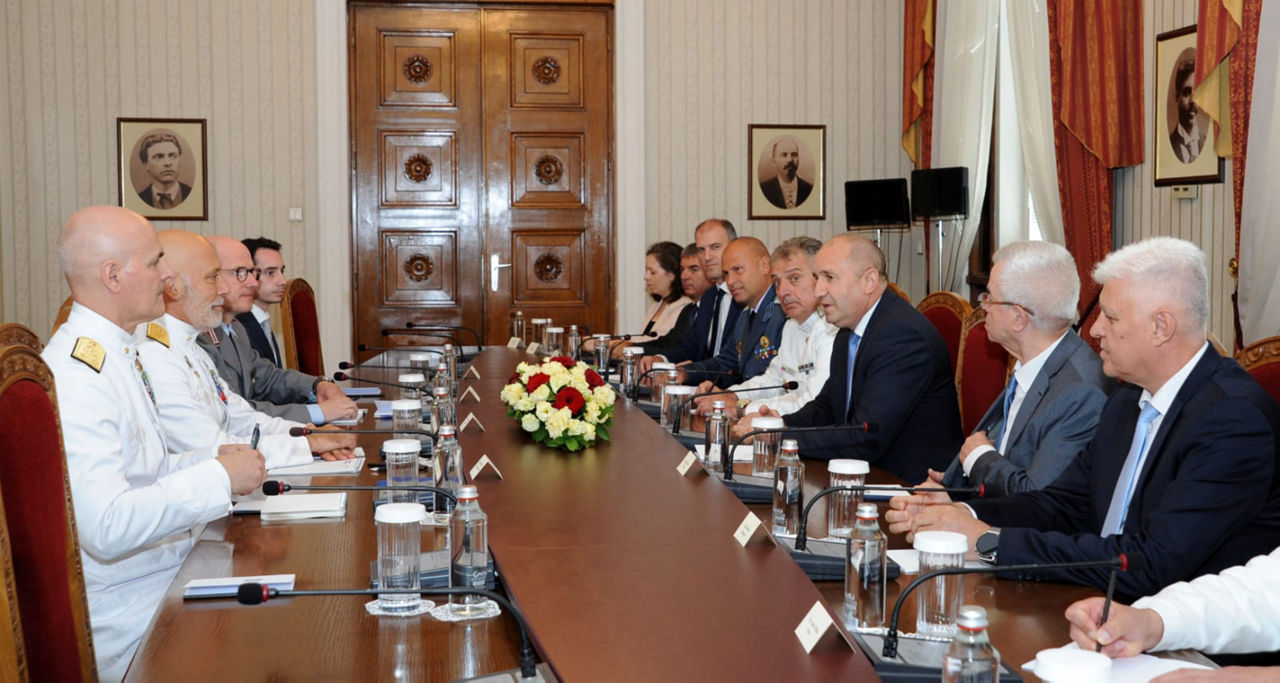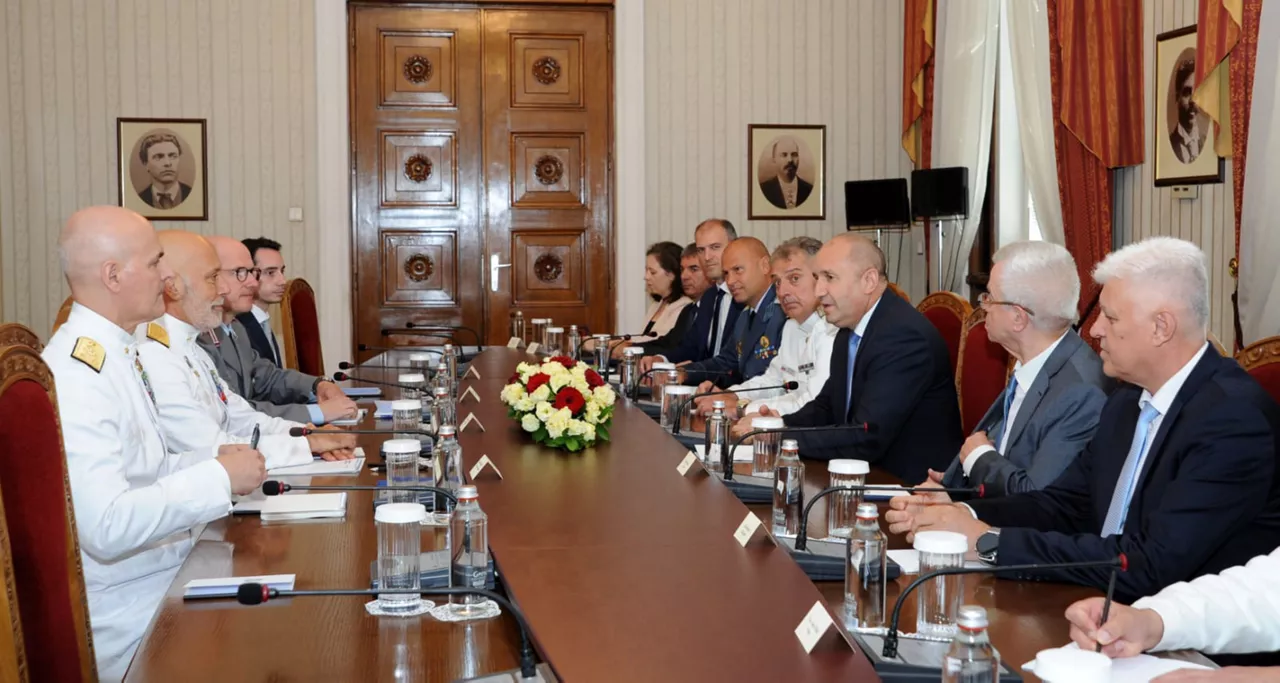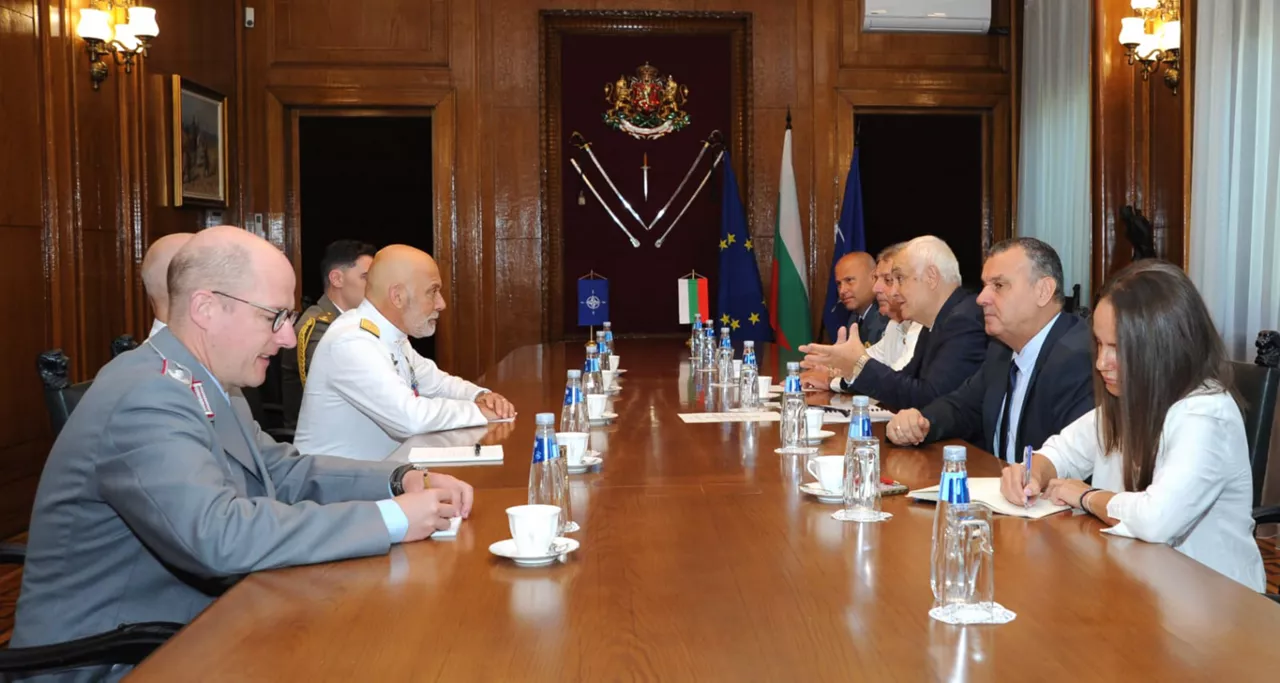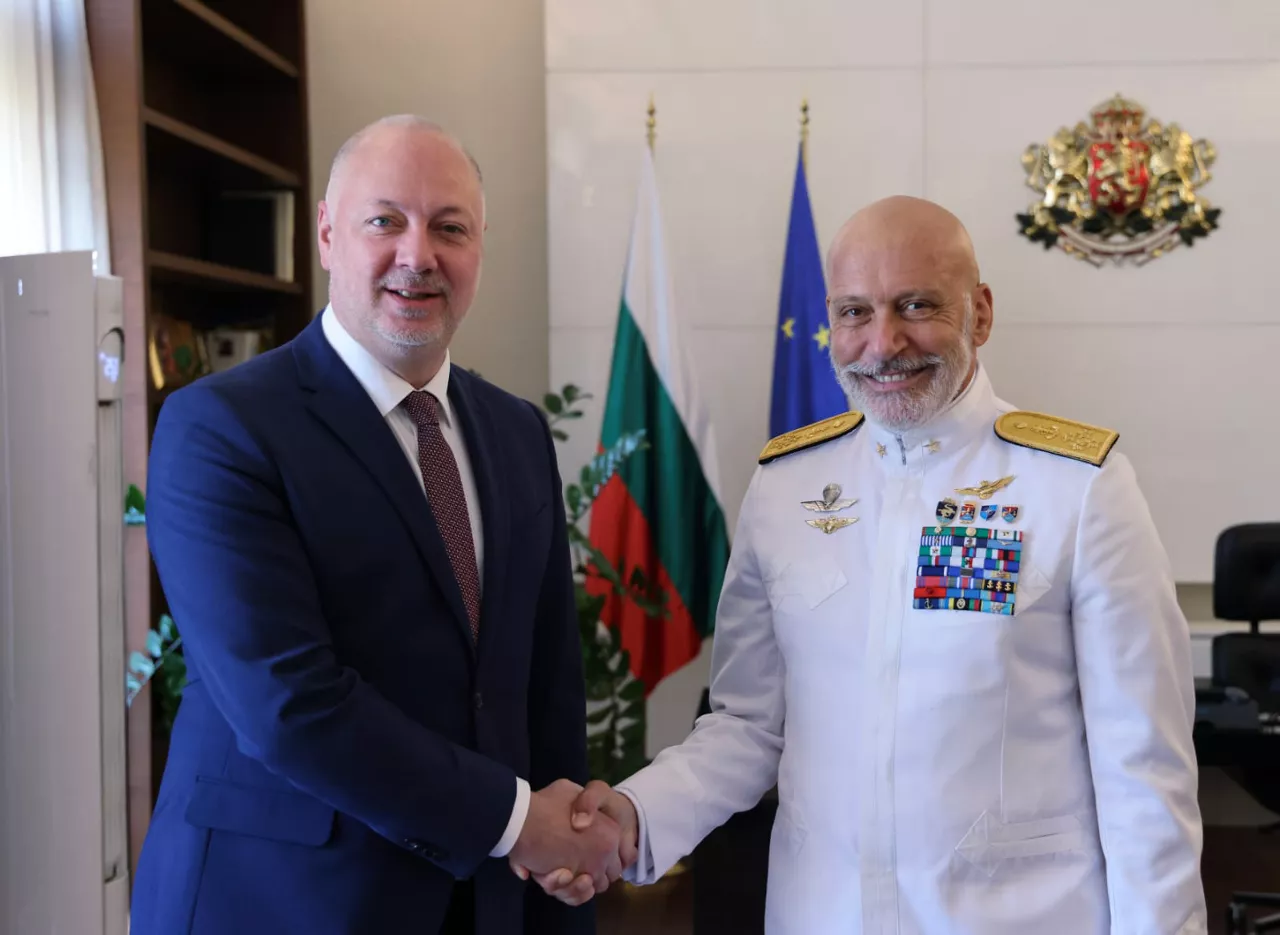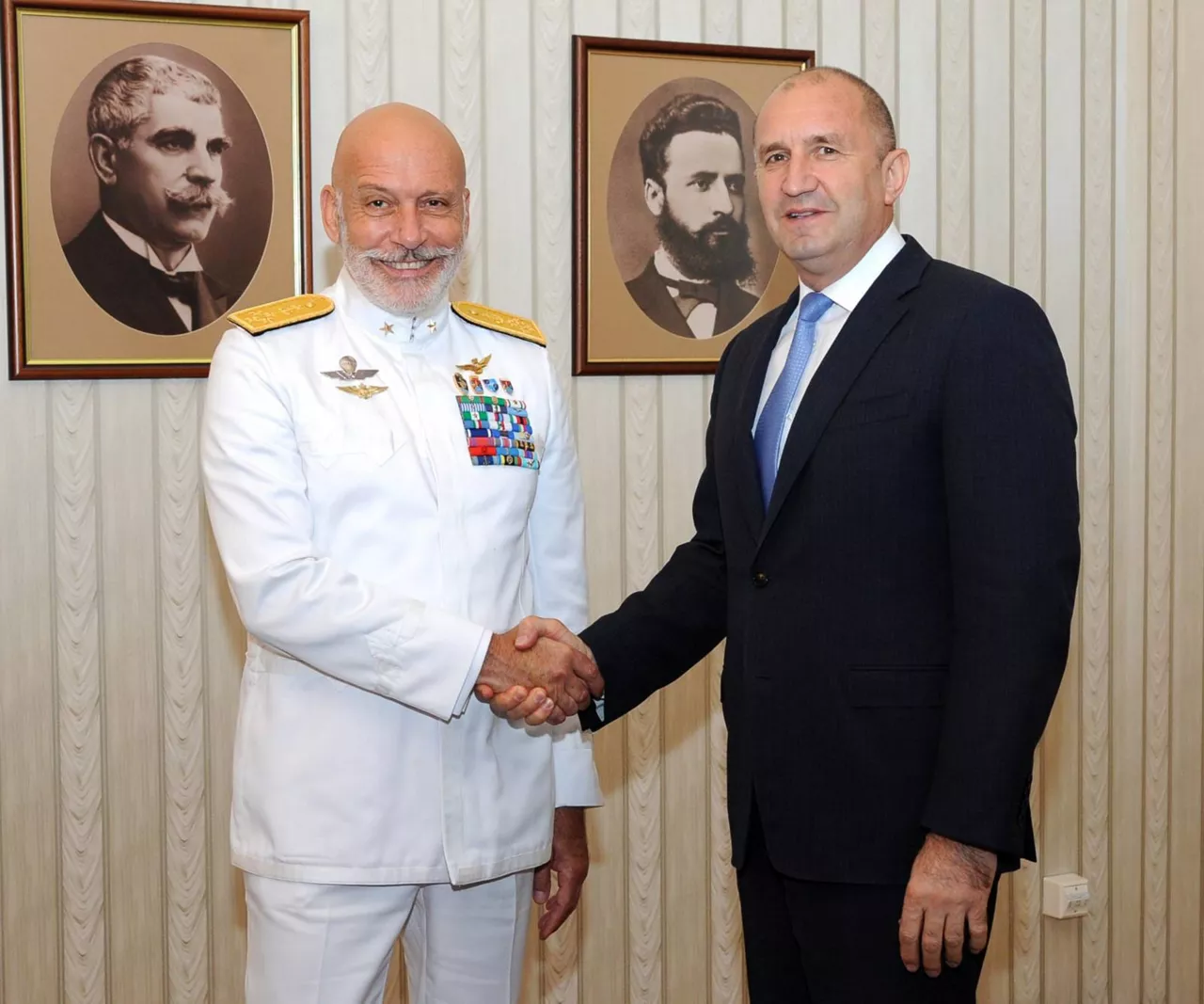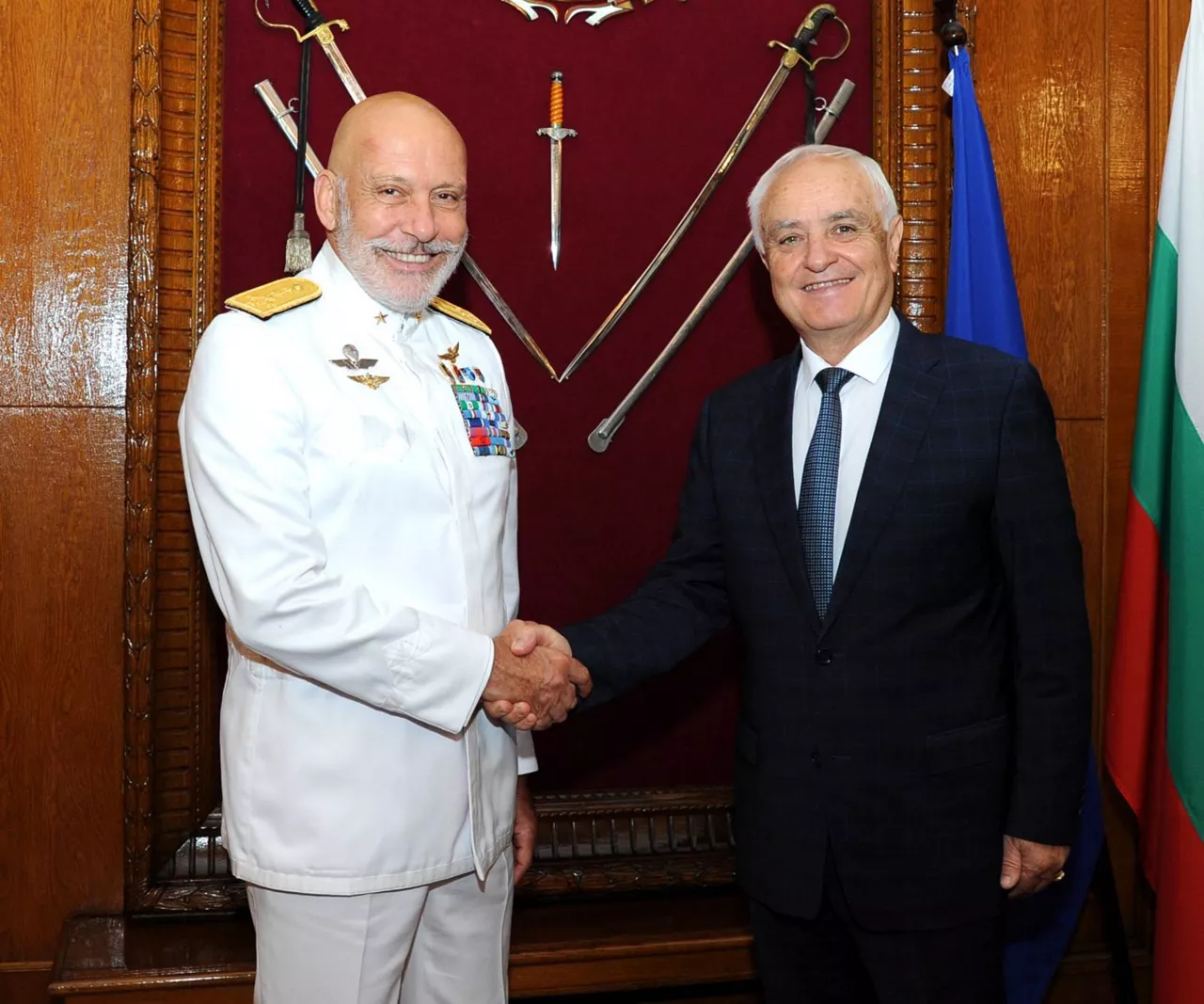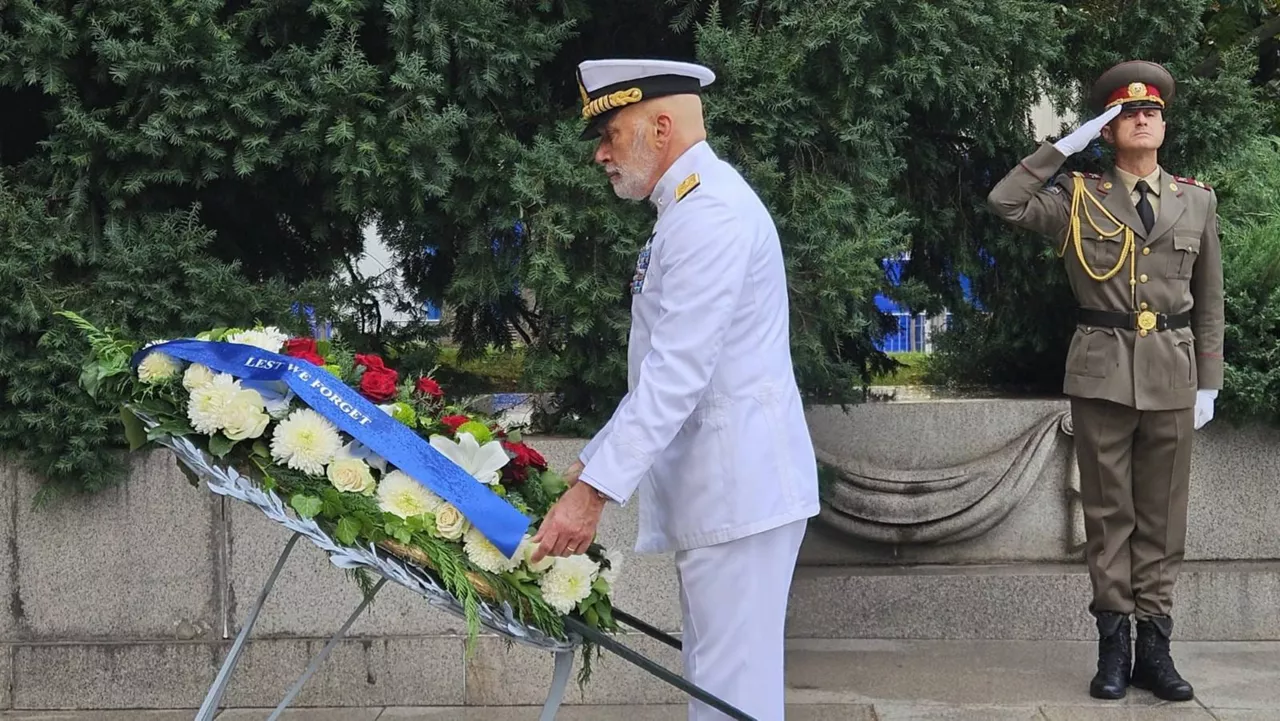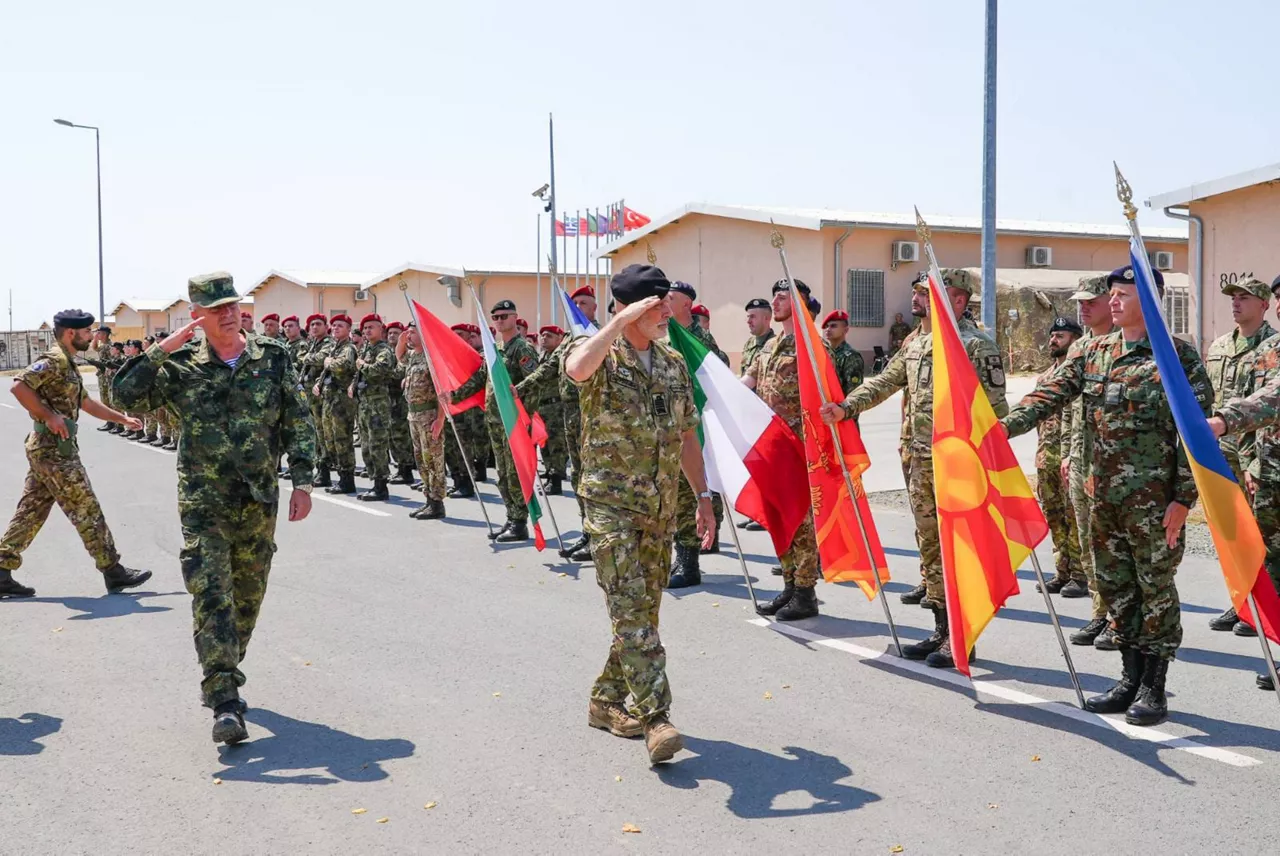Download NATO’s broadcast-quality video content free of charge

Log in
NATO MULTIMEDIA ACCOUNT
Access NATO’s broadcast-quality video content free of charge

Check your inbox and enter verification code
You have successfully created your account
From now on you can download videos from our website
Subscribe to our newsletter
If you would also like to subscribe to the newsletter and receive our latest updates, click on the button below.
Enter the email address you registered with and we will send you a code to reset your password.
Didn't receive a code? Send new Code
The password must be at least 12 characters long, no spaces, include upper/lowercase letters, numbers and symbols.
Your password has been updated
Click the button to return to the page you were on and log in with your new password.
(As delivered)
Thank you very much. Marie Agnes and Michael, it's great to be back in the European Parliament. I was there just two days ago for an event with the NATO Parliamentary Assembly. I was here with the Munich Security Conference like 10 days ago. So we are discussing whether the paycheck this month should be paid by the EU or NATO.
But on a more serious note, I had also the pleasure to speak to this committee in March about the preparations for the NATO Summit. And there were quite a lot of questions, and there were quite a lot of discussions on what is planned, what is ahead of us? What are the opportunities? And I'm really very happy to report back to you today about the outcomes of a very successful summit, a summit where Allies have stepped up to bold decisions and sent a very strong message of Transatlantic unity, but also Transatlantic resolve back home and I think in all our domestic political discussions, but also here, we tend to overuse the word historic.
But I do believe the NATO Summit in The Hague was really nothing short of it, we put our Alliance on a stronger and fairer footing for decades to come. At the core of the summit was, of course, the so called Hague defence investment plan to raise defence spending to 5% of GDP by 2035 and this truly is historic. It will massively increase NATO strength and capabilities. It will send a message to our citizens that we will keep them safe, but it also sends a clear signal to our adversaries that we will do whatever it takes to protect our freedom and our peace.
This requires, of course, tough choices from politicians, parliamentarians, governments. It does require sacrifices from our citizens, because being prepared comes with a price. It does cost a lot of money, but it is the price that we must pay to preserve peace, not preparing to prevent war will cost us much, much more. Therefore, our decision, the decision of the Allies, was to face reality and deal with the world as it is. There is on one side, hot war at the heart of Europe, instability across the Middle East, divisive rhetoric in the Western Balkans, cyber attacks and sabotage against a number of our Allies, our own nations.
And there is also the ongoing threat of terrorism that we should not forget, even when the brutal war in Ukraine eventually ends, let us not be naive. The danger will not disappear. Russia is reconstituting faster than many people thought, including by dramatically increases of its drone production. Putin has rattled his nuclear saber. He's stepping up his savage attacks on Ukraine on a daily level.
On a daily note, we have incredible, very intensive attacks, especially to civilians, especially to residential areas, and he will not hesitate to use force to get what he wants. So we have all seen the warnings from many military colleagues across the Alliance, Russia could be ready to mount a full scale attack on NATO territory in three to seven years. So we can't wait until war is upon us, because then it would be too late. We live in turbulent times, and turbulent times demand bold actions from all of us, especially parliamentarians and governments, not least given the important channel that we all have towards our citizens, to our public, our our voters, our constituencies.
So let me touch briefly on three priorities in these opening remarks, investing in strong defences, in strong institutions and in a strong and free Ukraine. First, some words on defence. Allies agreed at the summit to spend out of the 5%, 3.5% of GDP on core military requirements on the heavy metal let me say that our men and women in uniform need to keep us safe. The figure is based on ambitious capability targets, which are based on NATO's robust defence plans. And there was a way that we have reached this number. We started with defence plans that were agreed among all NATO Allies. Then we moved on to defining the capability targets that we needed. All Allies agreed.
And this is where the 3.5% assessment and number came afterwards. So as well as providing our armed forces with what they need, this sends also a strong political signal that we are serious about our security. Also this percentage, the 3.5% will also allow for European Allies and Canada to equalize, finally, with what the US spends on defence, and it will put an end to the debates that have been there from as long as we all remember on fair burden sharing. At the same time, together with the 3.5% decision, Allies agreed to spend 1.5% of GDP on defence and security related investments.
And this takes into account various aspects of what we need to do, strong cyber defences, secure supply chains, better roads, railways and ports to support our our defence plans, stronger and more innovative defence industry on both sides of the Atlantic. So, as the Secretary General has repeatedly said, we need to produce more. We need to produce better, we need to produce faster, and we need to produce together to make sure that we are neither out produced nor outgunned. This is not only vital for our security, it is also good for our economies, because these are well paid, good jobs that can provide us with the necessary capabilities.
So we welcome the fact that the EU is really stepping up on defence through the readiness 2030 proposals, the European Defence Industry Strategy and in the next multi annual financial framework. But to keep Europe safe, we must ensure that our efforts are truly Transatlantic, and this is what we have been advocating since the start. So our call is always to bring down barriers and ensure greater cooperation between Allies, just as we are seeing in parts of this industry, because the contributions and the capabilities of NATO non-EU Allies are indispensable also for our collective defence.
Which brings me to my second point, and this is strengthening EU NATO cooperation. And I know that this is an issue dear to all of you in this building, but also very important for us in NATO. And this is why I will not try to convince you how important this cooperation is. The Secretary General and myself, we are very serious about this, and the level of engagement in the last period was really a clear indication to this.
After NATO, in a way, we do see European institutions and this as a second home to us. We already cooperate very closely across the board, from maritime security, which has become a really important issue, to cyber defence. For more than 30 years, NATO and EU have worked closely together in the Western Balkans, where NATO provides the security framework for EU to support the EU political dialogue. And as someone coming from that region, let me testify to this, that whenever NATO and EU work together, good things happened.
And this is this is why we see our roles as mutually reinforcing and complementary, and we want to say that we can do much more together, not least when it comes to boosting our defence industry resilience and critical infrastructure and developing new capabilities. One of those examples is the multinational multi role Tanker Transport Aircraft fleet, which is an excellent example that when we work together, we end up with excellent capabilities that manage air to air refueling, air transport, medical evacuation. And we have now received two more members, Denmark and Sweden, that have increased this fleet.
And of course, we must continue our close cooperation on Ukraine, which brings me to my third and last point. We all want Russia to stop its brutal war. We all want just and lasting peace for Ukraine. This was the other clear message from the summit, and it was also a very clear message from the NATO Secretary General Rutte's meeting with us, President Trump at the White House, just two days ago, the President announced a major new deal to supply Ukraine with massive amounts of military equipment. And European Allies and Canada are stepping up to finance and support this opportunity.
This is hugely important for Ukraine, it will speed up the flow of weapons so that Ukraine can really defend itself today, but also deter future aggression, and it is hugely important for transatlantic support, solidarity and security. NATO Allies have already pledged 35 billion euros in military aid for Ukraine, just for this year, for the first six months of this year, our support and procurement agency, NSPA, recently concluded several framework contracts that are worth 4.7 billion euros for critical munition to both fill Allied stocks, but especially to support Ukraine, and we continue to support Ukraine through our command in Wiesbaden, our centre in Poland and our office in Kyiv. We will continue to support Ukraine on its irreversible path to NATO membership, and we count on your efforts to bring Ukraine closer to the EU family. Going forward, there is even more we can do together to boost the Ukrainian defence industry and to better integrate the industry with our own. All these matters for Ukraine security, but as you have rightly said, Madam Chair, this is our security as well.
So dear colleagues, dear friends, there is much that we have to do. NATO and the EU governments, parliaments, industry, the people in our countries. The NATO summit was just the start of a bold new chapter for our security. And as we have mentioned several times, now is the time to roll up the sleeves and really deliver, deliver, deliver. Let me thank you for a sustained effort and support to our partnership, and thank you for your attention, looking forward to the discussion. Thank you.
Marie-Agnes Strack-Zimmermann, Chair
Thank you very much, and in this first round, we share it, Michael and me, I will give the floor to the coordinators of the replacement from EPP, S&D, Patriots and ECR for one minute. After that, Ms Shekerinska will respond for a maximum of eight minutes. The second round with the remaining groups, and the catch the eye will be shared by the [inaudible]. So we start for EPP, SEDE coordinator, Nicolás Pascual de la Parte, the floor is yours.
Nicolás Pascual de la Parte, Member of the Committee on Security and Defence
Thank you very much for your readout of the Summit. It was an unusual Summit for an unusual time. I mean, the Summit took place, was shortened to one day only, actually two and a half hours they were discussing, and only five minutes for every chief of state and government. But despite all this shortened format and despite all the threats preceding the Summit concerning the collective security clause and so on, I think that the result, the outcome, has been positive. More positive than a schedule, because this collective security of the Article 5 of the Washington Treaty has been reaffirmed. It's clear. Second, the assistance to Ukraine has also been strengthened, though there is no timetable for the membership of Ukraine to NATO. The transfer of money to Ukraine could be considered to be part of the 3.5% GDP in investment in defence, which is a good positive incentive for the States to continue assisting Ukraine. Russia was supposed to be the main threat, and this is also a strong message to Russia, we are going to spend as much money to get all the resources we need to create, to set up a credible deterrence against you. No China, this time, no China reference [inaudible] in five paras it's difficult to cover everything. The new defence spending pledge, I will not go into it, because you have explained quite quickly and quite well. Other priority was to keep the Americans anchored Europe, because we need the Americans and the American transatlantic link in order to set our strategic autonomy in Europe as a strong pillar of NATO. And I think that is also an objective. Another objective was, obviously, was to convince Trump to be good in the negotiations on the tariff, ongoing negotiations on the tariff with Europe, which so far, has not been successful. And finally, last but not least, our commitment to the capability targets agreed upon by the Ministers of Defence of the 5th of June. All these outcomes are positive, I congratulate myself and yourself and everybody. But now in the implementation of this is the proof of the cake. Thank you very much.
Marie-Agnes Strack-Zimmermann, Chair
Thank you very much for [inaudible] EPP, Michael Gahler.
Michael Gahler, Member of the Committee on Foreign Affairs
Yes, thank you. I would like to raise one issue in NATO-EU cooperation, and it is on military mobility, which is the, what is other bodies that are, I hope, on a daily basis between EU and NATO cooperating, because it doesn't require only the defence people, but also the transport people and all these infrastructure development. So, what, which are the bodies that are there in contact? The other thing, as NATO member states will pay for these additional American weapons, and some have already said, okay, we will contribute, where is the focal point in NATO, where to coordinate all that and to get the monies together? And then, [inaudible] well, it was 12 days ago that Putin said that he needs 60 days to end the war and to reach the annexed, the territories he annexed. Now it's logic then, two days ago, Trump demanded 50 days to end it. And my question is, as the Secretary General Rutte so kindly worded the achievements of Mr. Trump, will he also kindly after the expiration of these 50 days remind him of the consequences that he announced. Thank you.
Marie-Agnes Strack-Zimmermann, Chair
Thank you very much, for S&D, SEDE coordinator Sven Mikser.
Sven Mikser, Member of the Committee on Foreign Affairs and the Committee on Security and Defence
Yes, thank you. The commitment to increase defence spending has been called one of the most tangible results of the Summit, but obviously it's only to become tangible by implementation. And the time frame for reaching this 3.5% is actually slightly longer than some of us in the northeastern part of the Alliance hoped. You mentioned how you arrived at this figure by the capability targets and force goals. So my question is, do we have sufficient means to actually assess our progress along the way, by observing the force goals and capability targets? So will we be able to say in one year's time, two years’ time, three years’ time, as to whether we are really on track of reaching this 3.5% by the year 2035?
Marie-Agnes Strack-Zimmermann, Chair
Thank you very much Sven. Now, Nacho Sánchez.
Nacho Sánchez, Member of the Committee on Foreign Affairs
I'm using Spanish, chair and dear guests. [Continues in Spanish]
Marie-Agnes Strack-Zimmermann, Chair
So I couldn't see any from the Patriots and from ECR, Alexandr.
Alexandr Vondra, Member of the Committee on Security and Defence
Thank you, Madam Chair, thank you, Madam Secretary. We fully support what you have said in your introductory remarks. And in fact, just listening the previous speech, send a message to Mark Rutte that we in ECR are absolutely happy with the way how is managing NATO. And just, you know, listening those two Spanish contributions here, one which I very appreciate, and the other one which I do not understand so much. It brings me, you know, there is a commitment, 5%. And there was one open descent, and that was the Spanish Prime Minister. So my question is, there are the conclusion that Allies agree. There's not that all Allies agree. So, because I did not notice any kind of a public assurance by Pedro Sánchez that he stays behind the conclusion. My question is whether you obtain some kind of assurance that Spain belongs, the government belongs among the Allies.
Marie-Agnes Strack-Zimmermann, Chair
So for the [inaudible], ECR... Okay, then we will continue. So Nathalie for Renew.
Nathalie Loiseau, Member of the Committee on Foreign Affairs and the Committee on Security and Defence
Thank you, chair. [Continues in French]
Marie-Agnes Strack-Zimmermann, Chair
AFET, somebody for AFET?. Yeah, Petras.
Petras Auštrevičius, Member of the Committee on Foreign Affairs and the Committee on Security and Defence
Thank you, chair. I think we have a very different NATO now, maybe for good, maybe for bad. I don't know. If you look to the declaration from 2023 there have been 90 paragraphs in the final communique. Now we have five. Next time will be one or two. Are we so concise, sending strong and unequivocal message to our partners and world around? I don't know. Yeah, people like short texts, but sometimes to understand complex situation, you need more paragraphs, more discussion, more clear messages to our potential adversaries. I'm not sure, I mean this time, the world understood that NATO stands more united and stronger. Well, you mentioned Madam Šekerinska, that we need to invest to the kind of hard core. But Ukraine's example is that we need something new. I mean, tanks themselves will not change the situation on the battlefield. Was there any good understanding? A shared vision about that NATO must, you know, embrace something new, adapt to the new situation, to what extent it was shared among the member states? Thank you.
Marie-Agnes Strack-Zimmermann, Chair
Thank you very much. For the Greens, Martins.
Mārtiņš Staķis, Member of the Committee on Security and Defence
Thank you, Madam Chair, and thank you, Ms Sekerinska, for your statement. As a representative from the Latvia, I do welcome the decision was made in The Hague, we already had 3.5% and for us Latvian politicians, it's easy, because actually our society demands at least five and we will definitely go for that. As far as I've spoken with representatives of Ministry of Defence, many are not entirely clear what was meant by this defence related spending. Maybe, this definitely needs to be more, I think, clarified. But my question is, yes, the Summit was indeed quite short, and as a result, many questions were not clearly answered. For example, what will be the status of US troops in in Europe, and how long will the US be willing to maintain its long term involvement in European security. So could you please clarify that? Thank you.
Marie-Agnes Strack-Zimmermann, Chair
Thank you very much. Somebody from the Greens for AFET, please.
Vladimir Prebilič, Member of the Committee on Foreign Affairs
Thank you very much. My name is Vladimir Prebilič from Slovenia. Thank you very much for your presentation, but nevertheless, I have two options, two questions, basically regarding the what was said before. The first one goes in the way, how we will spend the money? Because there was a lot of debate within European Union that we should spend this money on European defence production, not United States productivity. So do we have here an agreement, how much, where, and so on. Because again, we were explained especially, I am coordinator in REGI. So we will sacrifice certain amount of money for something that should revive also our European economy. So how is this going to be developed? And the second one is in the way of so-called security literacy across European continent. Of course, we can enhance the budget. We can give 4, 5, 6, 7%, but at the end of the day, we will need to have support of constituency, of the people that we all represent. I am not sure that they understand the essence of security, one and the second one. Regardless how many weapons we were going to buy, we would need soldiers as well. I do not detect willingness for Europeans to take part in this kind of endeavor. So what is your standpoint on that? Thank you very much.
Marie-Agnes Strack-Zimmermann, Chair
Thank you very much. Now I couldn't see somebody from the left or from the [inaudible], so the floor is yours.
Deputy Secretary General Radmila Shekerinska
Thank you, and forgive me. I'll try to cover all of them. Let me first start by the analysis of the Summit, and how you said it was a short Summit, one day, one meeting of several hours. It wasn't a short one let me tell you. It's difficult to say to leaders to speak five minutes, right? But actually, the good thing, or the real work at most Summits, happens before the Summit. And it was a really long way. When I remember our first NAC meeting where the formal preparation for the Summit started, I mean, today's declaration would have been seen as very difficult to achieve. So there was a lot of preparation. We have had, additionally, a [NATO-Ukraine Council] meeting with our Ukrainian colleagues, with the Ministers of Foreign Affairs. We have had a separate meeting of the Ministers of Defence. We have had a number of meetings, the bilateral meetings with the EU and Ukraine, meetings with Ukraine. So it was really a packed Summit. But what I think was very important was the outcome, and as I was joking, it was a bit like a version of old Churchill statement. If you want a short speech, you need more time, right? If you want to have a big decision, you actually should focus on the decision and not so much on the text. So I really believe that we should not actually add negative context or negative explanation in the short. It was a straightforward declaration, because at this time and in these turbulent times, we need a straightforward communication with our public also sending a message to our adversaries. So in that respect, the Summit was a transatlantic unity in action. Because I do remember our discussions just few months ago, and I remember we have had more or less the same questions, will the US remain committed? Will they appoint a new SACEUR? Will we see the US troops continue their presence here? Well, I do believe that we have to now take these things in perspective. And see, yes, we have a new US General who is the new SACEUR with the equal commitment that we have heard at the Summit, but also in the meetings in the White House. So I will not go into the domain which is not ours, tariffs. Fortunately, you know, I miss my parliamentary debates where we do have a much wider domain that we discuss, but here we focus on our security issues. And let me tell you that the discussions that we have had, the Secretary General had with the US President, were not only focused on content, but they actually produced meaningful results. Did we want to hear again, the US commitment to the Alliance? Everyone did, and we had that at the Summit and after the Summit. Did we want to have the clear commitment and clear statement that Russia is the long-term threat to our security? We have it in the declaration. Did we want clear language on continuing our support to Ukraine? We have it in the declaration. This does not happen overnight, and this was a result of this, I would say, deep and productive relationship that the Secretary General has with the US President and the respect that they enjoy among themselves. So we saw this as an important path to a successful Summit. And in that respect, even the short format was actually more straightforward in delivering that that message.
On the issue of military mobility. Military mobility is one of the, if I'm not mistaken, seven avenues for a so-called structured dialogue between the EU and NATO. And we have regular meetings by specialised teams. And you're absolutely right. It's not just the military, it's quite a lot of civilian structure. So we had the European Commissioner visiting us at the NAC and giving a statement and engaging in a very useful dialogue with the North Atlantic Council. On the 2035, there was a lot of discussion about the timetable, because the target is important, but actually the time frame equally is influencing the outcome. And there were countries who wanted to have that deadline sooner rather than later. But I should not explain the art of compromise to this room, right? And we believe that quite a number of Allies after the Summit have committed to even a more ambitious trajectory. And this is important because, as you have mentioned, there are several countries in our Eastern Flank, the North, others as well, who have been there for quite some time. So we just want to have the commitment of all to go in the same direction. We will be monitoring just as we were monitoring before the 2% commitment. And this goes back to the question of, how do you define? Well, I don't think that we have to come up with additional new definitions, because what we used as definition to core military expenses of 2% for the Wales commitment will be used now for the 3.5%. And on the definition of the remaining 1.5% Allies also agreed, it was in a committee work so completely invisible for the Summit audience, but it actually happened before the Summit. We have agreed on a document what are the expenses that can be calculated within the 1.5. I will not go into the details of any Allies relationship with the EU because this is not our forte. But I will say that we have had a difficult discussion on the percentages, but at the end of the day, there was a very clear understanding: we all commit to this 5% pledge, because we have all committed to the defence capability targets. And this has happened just month before the Summit. And of course, different countries can have different sovereign paths to reach these capability targets. But in essence, is that in due time, we will have them, and they will provide for our readiness and our war fighting capabilities.
On the issue of US troops reductions, and similarly, the US commitment to European security, the US officials have reinstated their commitment to NATO and to ensuring that our deterrence and defence remains robust. And this was important. Of course, force posture is never a static thing. I mean, throughout all these years, we have seen changes. And we all as Allies in the Alliance, we make our sovereign choices right? We change, sometimes our contributions to different parts. But the commitment was there. We heard it in the White House. We heard it at the Summit. We heard it in the Congress. We hear it in opinion polls, where a huge majority of US citizens say we are committed. But whenever we talk about the commitment, we have to say that there is also an expectation on the other side of the Atlantic. And I think we all agree that it's not unjustified. There is the expectation that all Allies will equally share the burden. And this is why the NATO Summit was important. It provides for a share, a fair burden sharing. And the development of the European pillar within NATO will show that we are dedicated to this kind of an Alliance. European Allies and Canada have already stepped up. I mean, if you look at our Command structure, you will see that a huge part of the Command structure, actually, even now, comes from European Allies, and we see this as a path to follow.
On the paragraphs, I think five result-oriented paragraphs are stronger than 19 pages. But you know, on these issues, we might differ. What we have seen also is that our relationship with Ukraine is very much a two-way street, and I want to spend just a minute on this. We have provided and we will continue to provide support to Ukraine. We talk about the irreversible path to you to NATO membership. What we also, have to be honest and say, Ukraine has developed really formidable military power. And we want this power to be on our side in a way, and their lessons from the war are actually something that we try to seize on a daily level. This is the purpose of our centre that we have developed in Poland. And, of course, under the shadow of 5% and big statements, the NATO Summit also endorsed the NATO Rapid Adoption Action Plan, which basically these deals with these issues. How do we use innovative solutions and not fight the old wars, but prepare really, for protection in the new way? And this Rapid Adoption Action Plan actually pushes all Allies into focusing on innovative approaches and adopting them. And NATO is very much focused on this. The Baltic Sentry, our SACT command in the US, they're really focused on using innovative ways in which we develop our capabilities. This is to say that NATO does not work only on Summits. I mean, it's really 365 days of work.
On the defence spending calculus, as I said, sovereign choices on the path. But we have seen quite a number of countries really moving forward and targeting 2029 or 2030 as their date for reaching. And this will send the strong message.
And finally, how to spend. What we say: we need to spend in more innovative ways. We need to spend faster, because money not spent until the end of the year is gone. As a [former] Minister of Defence, I have been constantly frustrated with this, but this is how life is. And then we have to also spend smarter. So this is why we talk very strongly about the benefits of joint procurements, regardless of what's the avenue that they use. And we use all these issues as also part of our dialogue with our constituency and with our public. And I think you're absolutely right. We don't need a one-time 5% commitment, not even a one-time 5% investment. Because one year will not do. In order for us to make this commitment sustainable in the years to come, we need to have the public on board. And citizens listen when we are honest and when we have the arguments. And what has happened to Ukraine, the signals in 2014 and then the attack in 2022, finally the brutal war on Ukraine. They were a wakeup call, and they were a wakeup call also for our citizens. Our goal as an Alliance remains to be defensive. We are a defensive Alliance. We want to deter and defend. But if we are to prevent war and protect our freedoms, we have to be prepared. And this is the call that we try to have in every Ally, and this is where we would like to see your support in the months and years to come. Thank you.
Michael Gahler, Chair
Thank you very much. If I allowed one remark, I think that now we had a very short statement, but I think the previous statements remain valid unless the opposite is said. Thank you. The next is Andrey novakov.
Andrey Novakov, Member of Committee on Security and Defence
Thank you, Chair. I'm happy that I can address particular importance, not only for the Eastern Flank of NATO, but for the whole Europe, and namely the Black Sea region. Because that's still the marcation line between the conflict and the peaceful continent. And I see that more and more operations are taking place in the Black Sea, and the European Union has already introduced a new strategy, and we still missing such strategy from NATO. So do you plan to update your plans regarding the regarding the Black Sea region, including positioning air to air missiles or close defence systems, or any types of defences which are going to secure our coast? Thanks so much.
Michael Gahler, Chair
Thank you. Next is to Nino.
Tonino Picula, Member of Committee on Foreign Affairs
Thank you. Micheal. Madam, Deputy Secretary General, Radmila. Thank you for your substantive overview and takes. It's for sure the golden age of EU soft power is passing. The time has come for the peace project to be able to defend itself. Former NATO Secretary General Manfred Worner once said security is the oxygen for democracy, and I agree with that. European Union has more inhabitants than US and Russia combined. The EU GDP is 12 times larger than Russia, but United States spends three times more on defence than all EU members combined. I wanted to ask you questions on the need to strengthen our resilience against innovative hybrid warfare, disinformation and foreign interference coming from Russia. As someone coming from the Western Balkans, you are very well aware of all threats to both EU and the NATO security. What are lessons learned, and what is NATO doing to tackle inventive approaches of Russia disinformation, particularly on social media, as seen recently in elections and referendums in some neighbouring countries, but also in our EU and NATO member states? And I'm also interested in STRATCOM and other forms of cooperation between us and NATO. Thank you in advance.
Michael Gahler, Chair
Thank you very much. Christophe Comal.
Christophe Gomart, Member of Committee on Security and Defence
Thank you. I'll be speaking French. Thank you very much for that presentation. You seem very happy with the NATO Summit. I thought it was hypocritical. We all know nobody's going to get up to 5%. The US is not even 5.5% so I think it's wishful thinking. How do you feel about Article Five? Do you really feel that after what Donald Trump said, Article Five would be applied? You say that NATO and EU should get together. So when is it going to be European rather than American? When are we going to stop taking orders from America and them telling us it should be 5%. We should be able to have our own defence architecture better.
José Cepeda, Member of Committee on Security and Defence
I wanted to thank you for being here, madam. And also wanted to welcome these Summits because it gave us a common target that of increasing investment in defence with a clear target that sends a clear message to Russia that we're going to be ready. When I was at the Parliamentary Assembly in Dayton a month or so back, we heard a lot from General Clark talking about the immense vulnerabilities of Europe between three or seven years, I think, was the figure. General Clark thought it was more like three to five years in terms of Russia's action. That's something we have to be aware of at NATO. I wanted to share with you this view. Well, the important thing is to talk about capabilities, more than just a percentage of X. X percentage is just a kind of like a market share that everyone's trying to obsessively achieve, rather than looking at their own capabilities. But what we want to do in Europe is for us to have some kind of independence, to develop our own capabilities given this threat. And I'd like to know what's your viewpoint? Are we going to be on time to deal with this threat, potential threat, as quickly as possible?
Matej Tonin, Member of Committee on Industry, Research and Energy
Radmila, when we're talking about defence spending, I have a feeling that, especially those who are complaining that we are too, too much dependent on United States, that those would be the forces who will, who would support the increase of defence spending, because more we will invest in defence, the more strategically independent Europe and European Union will be. So we can read the declaration that we the Heads of States and Governments, have gathered and we reaffirmed and so on. But after that, we had some statements from Spanish Prime Minister and even some statements from Slovenian Prime Ministers who are saying they didn't commit to such statements. So I'm asking you if, at the session, at the Summit, were some Prime Ministers who were saying that the meeting that they will not commit to those 5% pledge, especially because after the Summit, there was [inaudible] debate back home in Slovenia, for example, Prime Minister even proposed the referendum to exit from the NATO, which is a crazy thing.
Michael Gahler, Member of Committee on Foreign Affairs
So thank you. Are there any other colleagues who would like to take the floor? That seems not to be the case, so I close. Yeah, sorry.
Nacho Sanchez Amor, Member of Committee on Foreign Affairs
Compatibility between BRICS and NATO, you didn't mention? Did Turkey apply to be member of BRICS. It is compatible to be member of BRICS, a member of NATO? Putting aside the S-400. Russia, S-400.
Michael Gahler, Member of Committee on Foreign Affairs
Okay, so once again, floor is yours.
Deputy Secretary General Radmila Shekerinska
Thank you very much. And let me start in just confirming your comment at, in the break. Yes, old statements remain valid, and this was a very clear message from Secretary General during all the conferences, press conferences before and after the Summit.
Let me start with the Black Sea, and thank you for the question. Just yesterday, I had a meeting with the Romanian Minister of Foreign Affairs, and we reiterated our assessment of the strategic importance of the Black Sea, not only because of the war in Ukraine, but also because this has been, this has been an area very important for NATO’s security. These are the issues that we have raised during several NAC meetings, and we will continue to work both within NATO and our structures, but also with the EU, having in mind the new strategy, adding the complementary value that NATO has to offer, but we are fully cognizant of the importance. We have seen this in the discussions of the coalition of the willing, very much. And we have seen it also in the developments over there, especially some of the successes that Ukraine had. It's –we, we are generally focusing on reinforcing our defence systems. We did it in other regions, but we are also focusing on reinforcing our defence systems in the Black Sea so that we can really deal with any threats.
On the issue of hybrid and disinformation that Tonino Picula asked, fully agree with you. Security is oxygen to democracy. Those of us who have gone through war and crisis, they know that the first casualty of hostility is the feeling of freedom and democracy, and they're always hit, even when peace comes back, democracy has difficulties to catch on and create roots, so we are within the structured dialogue with the EU. This –the hybrid domain is an issue where we talk a lot with our EU counterparts. NATO has focused a bit more with the elements of sabotage in some of the Allies, but quite a number of Allies have raised the issue of disinformation, especially during election campaigns. And they have raised the issue of this kind of undermining of both our unity but also our security.
So on strategic communication, we are also using, you know, the tools and the knowledge that EU has. This has been our goal, Secretary General and myself, you know, let us work in areas where we have, we have the strong expertise. So maybe we focus a bit more. This is why, on military capabilities, on the hard power, but we fully appreciate and seize the experience that EU has on elements of this hybrid activities. But we have been also worried about very visible cases of sabotage in countries, we have been very worried about the attacks to our critical underwater infrastructure, but also generally critical infrastructure, and some of our military posture has changed because of them. I mean, the whole thing of the Baltic Sentry was provoked by actions of the Russian shadow fleet, and it has shown that NATO can respond in an asymmetric way in practically less than few months.
So this is –this also talks that we are, we do have the readiness. We just need to employ it whenever, whenever it is necessary.
On the issue of 5% and who is, who has decided on this? I actually disagree that [inaudible] will, will not we have several countries which are already at 5% and we have countries which have created more ambitious deadlines than the NATO deadline, last one being Germany, one of the big economies. So of course, we will have differences in the pace. We will have differences in the timetable, maybe, but the commitment is there. And let me say all Allies have agreed to a short declaration so nobody can say that they didn't have the time to read it. So there was a very clear commitment on this.
We have different views on what are the annual increases, what are the sovereign paths to meeting the capability targets, but we all agree we need them, and because we all agree that we need more security. So I do believe that on the fairness, I share, you know, [inaudible] comment, you know, in order for the Alliance to be stronger and more balanced, we have to be fair also in the burden sharing. I think I have used this the last time I was, I was here, but I will use it once again. I quoted JFK on the need for Europe to step up. JFK, distant history for all of us, right?
But actually, I was reminded by some colleagues it wasn't JFK who first raised it. It was Eisenhower. So at the birth of this Alliance, there was this strong message coming from our American colleagues that they cannot continue to supply us with the necessary security guarantees if we don't step up, and we do have the capacity to step up, because, as many people have said, these are all remarkable economies.
Russia, I don't think that Russia can match even Italy's GDP, and we are talking about addressing this threat, so I think it's doable. So fully agree with you, cash itself does not deter, we need the capabilities, and this is why, this is why our focus will be on the capabilities, and this is where the 3.5% came.
So some of the countries are actually even focusing some of the money, even more money, than 3.5% but the 3.5% is very directly linked to the very concrete set of capabilities that all our countries received, and they all, we all agreed to. They're 30% more ambitious than the last ones. So this is, this is a clear to do, to do list. I do think that I have covered all of it.
We have had certain differences among Allies. As an Alliance has. We don't interfere in sovereign decisions of governments on many other things, based on your question. We don't try to have the NATO Alliance as an all-encompassing Alliance that dictates, because this would not work, but what we share is a commitment to our security, and what we share now after the Summit, is a commitment that we will make the necessary investment. It is not a check written elsewhere. These are all sovereign decisions of governments. They will decide where they procure their defence capabilities. We always raise the issue of trying to keep the defence industry base as wide as possible, because even the transatlantic industrial base is sometimes not enough. This is why we talk with the Indo Pacific countries who can be valuable aid, don't –we try to raise the awareness that barriers can only limit our defence capability procurement, because we do believe that we need to do this as soon as possible. The assessments are different, but they're all troubling, and we all want to have these capabilities in the appropriate timing so that we can continue to keep our Alliance and our citizens safe. Thank you.
Marie-Agnes Strack-Zimmermann, Chair
Thank you very much. Deputy Secretary General, Ms Shekerinska. Great pleasure. Thank you for your time, dear colleagues. This concludes our exchange of views, and after three minutes break, SEDE members will continue with a meeting in this room. So thank you very much and have a good day.

